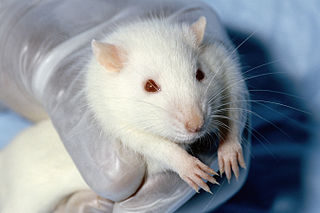
People for the Ethical Treatment of Animals is an American animal rights nonprofit organization based in Norfolk, Virginia, and led by Ingrid Newkirk, its international president.

Animal testing, also known as animal experimentation, animal research, and in vivo testing, is the use of non-human animals, such as model organisms, in experiments that seek to control the variables that affect the behavior or biological system under study. This approach can be contrasted with field studies in which animals are observed in their natural environments or habitats. Experimental research with animals is usually conducted in universities, medical schools, pharmaceutical companies, defense establishments, and commercial facilities that provide animal-testing services to the industry. The focus of animal testing varies on a continuum from pure research, focusing on developing fundamental knowledge of an organism, to applied research, which may focus on answering some questions of great practical importance, such as finding a cure for a disease. Examples of applied research include testing disease treatments, breeding, defense research, and toxicology, including cosmetics testing. In education, animal testing is sometimes a component of biology or psychology courses.

Huntingdon Life Sciences (HLS) was a contract research organisation (CRO) organized in Maryland and headquartered in East Millstone, New Jersey. It was founded in 1951 in Cambridgeshire, England. It had two laboratories in the United Kingdom and one in the United States. With over 1,600 employees, it was the largest non-clinical CRO in Europe and the third-largest non-clinical CRO in the world. In September 2015, Huntingdon Life Sciences, Harlan Laboratories, GFA, NDA Analytics and LSR associates merged into Envigo.
Stop Huntingdon Animal Cruelty (SHAC) was an international animal rights campaign to close down Huntingdon Life Sciences (HLS), Europe's largest contract animal-testing laboratory. HLS tests medical and non-medical substances on around 75,000 animals every year, from rats to primates. It has been the subject of several major leaks or undercover investigations by activists and reporters since 1989.
Barry Horne was an English animal rights activist. He became known around the world in December 1998, when he engaged in a 68-day hunger strike in an effort to persuade the government to hold a public inquiry into animal testing, something the Labour Party had said it would do before it came to power in 1997. The hunger strike took place while Horne was serving an 18-year sentence for planting incendiary devices in stores that sold fur coats and leather products, the longest sentence handed down to any animal rights activist by a British court.
Keith Mann is a British animal rights campaigner and direct action activist who acted as a spokesman for the Animal Liberation Front (ALF), and was alleged by police in 2005 to be a ringleader for the ALF. He was imprisoned twice, and is the author of From Dusk 'til Dawn: An Insider's View of the Growth of the Animal Liberation Movement (2007).

The animal rightsmovement, sometimes called the animal liberation, animal personhood, or animal advocacy movement, is a social movement that advocates an end to the rigid moral and legal distinction drawn between human and non-human animals, an end to the status of animals as property, and an end to their use in the research, food, clothing, and entertainment industries.
Shamrock Farm was the United Kingdom's only non-human primate importation and quarantine centre, located in Small Dole, near Henfield in West Sussex. The centre, owned by Bausch and Lomb and run by Charles River Laboratories, Inc. for Shamrock (GB) Ltd, provided animals to various laboratories and universities for use in animal testing. It was Europe's largest supplier of primates to laboratories, and held up to 350 monkeys at a time.
SPEAK is a British animal rights group working to end animal testing in the UK.
Animal Liberation Leagues were a network of animal rights organizations active in the UK in the 1980s. Whereas the Animal Liberation Front specialized in clandestine activity, mainly masked, at night, and involving small numbers of people, the Animal Liberation Leagues consisted of coordinated raids, or 'invasions', by a large number of people, mainly carried out during the day. One journalist described the Animal Liberation Leagues as "a sophisticated...development in the move to direct action". Raids were often carried out at the same time as legal demonstrations.

Pro-Test was a British group that promoted and supported animal testing in medical research. It was founded on 29 January 2006 to counter SPEAK, an animal-rights campaign opposing the construction by Oxford University of a biomedical and animal-research facility, which SPEAK believes may include a primate-testing centre. Pro-Test held its first rally on 25 February 2006, attracting hundreds in support of the research facility and opposed by a smaller number of anti-lab demonstrators.
Gillian Rose Langley is a British scientist and writer who specialises in alternatives to animal testing and animal rights. She was, from 1981 until 2009, the science director of the Dr Hadwen Trust for Humane Research, a medical research charity developing non-animal research techniques. She was an anti-vivisection member of the British government's Animal Procedures Committee for eight years, and has worked as a consultant on non-animal techniques for the European Commission, and for animal protection organizations in Europe and the United States. Between 2010 and 2016 she was a consultant for Humane Society International.

The international trade in primates sees 32,000 wild non-human primates (NHPs) trapped and sold on the international market every year. They are sold mostly for use in animal testing, but also for food, for exhibition in zoos and circuses, and for private use as companion animals.

Experiments involving non-human primates (NHPs) include toxicity testing for medical and non-medical substances; studies of infectious disease, such as HIV and hepatitis; neurological studies; behavior and cognition; reproduction; genetics; and xenotransplantation. Around 65,000 NHPs are used every year in the United States, and around 7,000 across the European Union. Most are purpose-bred, while some are caught in the wild.
This timeline of Animal Liberation Front (ALF) actions describes the history, consequences and theory of direct action on behalf of animals by animal liberation activists using, or associated with the ALF.

In Defense of Animals (IDA) is an animal protection organization founded in 1983 in San Rafael, California, United States. The group's slogan is "working to protect the rights, welfare, and habitats of animals".

The Animal Liberation Front (ALF) is an international, leaderless, decentralized movement that emerged in Britain in the 1970s, evolving from the Bands of Mercy. It operates without a formal leadership structure and engages in direct actions aimed at opposing animal cruelty.
Mel Brown is a British landscape gardener and animal rights activist who rose to public prominence due to a planned bombing campaign aimed at preventing the construction of a new research laboratory at Oxford University. He was the co-founder in 2004, with Robert Cogswell, of SPEAK, The Voice for the Animals, a campaign to stop animal testing in Britain, which is focused on opposition to a new animal laboratory at Oxford University.
Heather Nicholson is a British animal rights activist.
Animal welfare and rights in the People's Republic of China is a topic of growing interest. China has had limited animal protections by international standards, and animal-rights activists have condemned the treatment of animals in the country. Movements towards animal welfare and animal rights are expanding in China, including among homegrown Chinese activists, but face resistance from nationalists.








